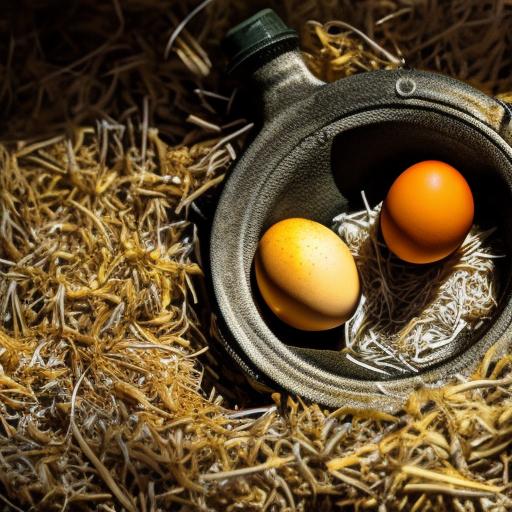Broiler chickens are a popular choice for farmers due to their fast growth rate and high meat production. However, many people may not be aware that broiler chickens can also be used for egg production. In this article, we will explore the potential of broiler chickens as egg layers and the importance of egg production in broiler chicken farming.
Egg production is an essential aspect of poultry farming, as eggs are a valuable source of protein and other nutrients. Broiler chickens have the potential to lay a significant number of eggs, making them a profitable option for farmers. By understanding the characteristics and factors that affect egg production in broiler chickens, farmers can make informed decisions about incorporating egg production into their broiler chicken farming operations.
Key Takeaways
- Broiler chickens are commonly raised for meat, but they can also be kept for egg production.
- Understanding the egg-laying potential of broiler chickens is important before deciding to keep them for eggs.
- Factors such as breed selection, housing, and feeding requirements should be considered before keeping broiler chickens for eggs.
- Choosing the right breeds of broiler chickens for egg production can maximize egg production and quality.
- Proper housing, feeding, and disease management are crucial for maintaining the health and productivity of broiler chickens in egg production.
Understanding Broiler Chickens and Their Egg-Laying Potential
Broiler chickens possess certain characteristics that make them good egg layers. They are known for their high feed conversion efficiency, which means they can convert feed into eggs more efficiently than other breeds of chickens. Additionally, broiler chickens have a high growth rate, which allows them to reach sexual maturity earlier than other breeds. This early maturity enables them to start laying eggs at a younger age.
However, there are several factors that can affect egg production in broiler chickens. These include genetics, nutrition, lighting conditions, and environmental factors. Genetics play a crucial role in determining the egg-laying potential of broiler chickens. Selecting breeds with a high genetic potential for egg production is essential for maximizing productivity. Nutrition is another critical factor, as broiler chickens require a balanced diet to support optimal egg production. Lighting conditions also play a role, as broiler chickens require a certain amount of light to stimulate egg production. Finally, environmental factors such as temperature and humidity can impact the health and productivity of broiler chickens.
Factors to Consider Before Keeping Broiler Chickens for Eggs
Before deciding to keep broiler chickens for egg production, there are several factors that farmers need to consider. One of the most important factors is space requirements. Broiler chickens need adequate space to move around and lay eggs comfortably. Overcrowding can lead to stress and reduced egg production. Farmers should ensure that they have enough space to accommodate the number of broiler chickens they plan to keep for egg production.
Another factor to consider is the cost of keeping broiler chickens for eggs. This includes the cost of purchasing the chickens, housing, feed, and other supplies. Farmers should carefully calculate the expenses involved in keeping broiler chickens for egg production to determine if it is financially viable for their operation.
Additionally, farmers need to consider the time commitment required for broiler chicken egg production. Collecting eggs, cleaning the coop, and monitoring the health of the chickens all require time and effort. Farmers should be prepared to dedicate sufficient time to ensure the success of their broiler chicken egg production venture.
Choosing the Right Breeds of Broiler Chickens for Egg Production
When it comes to choosing breeds of broiler chickens for egg production, there are several popular options available. Each breed has its own characteristics and egg-laying potential. Some of the popular breeds include:
1. White Leghorn: White Leghorns are known for their high egg production rates. They are small in size and have a slender build, making them efficient layers. They are also known for their ability to lay large white eggs consistently.
2. Rhode Island Red: Rhode Island Reds are a dual-purpose breed that is known for both meat and egg production. They have a calm temperament and are excellent layers of brown eggs.
3. Sussex: Sussex chickens are known for their versatility and adaptability. They come in various colors, including white, red, and speckled. Sussex chickens are good layers and produce brown eggs.
Choosing the right breed of broiler chickens for egg production depends on the specific goals and preferences of the farmer. It is important to consider factors such as egg production rates, egg color, and temperament when selecting breeds.
Housing and Feeding Requirements for Broiler Chickens Kept for Eggs
Proper housing and feeding are crucial for the success of broiler chicken egg production. When it comes to housing options, farmers have several choices. They can opt for traditional chicken coops, free-range systems, or even mobile coops. The key is to provide a clean and comfortable environment that allows broiler chickens to lay eggs without stress.
Feeding requirements for broiler chickens in egg production are similar to those for meat production. A balanced diet that includes a mix of grains, protein sources, vitamins, and minerals is essential for optimal egg production. Farmers should ensure that their broiler chickens have access to fresh water at all times and provide them with a consistent feeding schedule.
Health and Disease Management for Broiler Chickens in Egg Production

Keeping broiler chickens healthy is crucial for maximizing egg production. Common health issues in broiler chickens kept for eggs include respiratory diseases, parasites, and nutritional deficiencies. Farmers should implement preventative measures such as regular vaccinations, proper sanitation practices, and regular health checks to minimize the risk of disease outbreaks.
Proper nutrition is also essential for maintaining the health of broiler chickens. A balanced diet that meets their nutritional needs will help prevent deficiencies and promote optimal egg production. Farmers should work with a veterinarian or poultry nutritionist to develop a feeding program that meets the specific requirements of their broiler chickens.
Egg Collection, Handling, and Storage for Broiler Chickens
Collecting eggs from broiler chickens requires careful attention to ensure their quality and freshness. Best practices for collecting eggs include collecting them frequently to prevent breakage or damage, handling them gently to avoid cracks or contamination, and storing them properly to maintain freshness.
Proper handling and storage of broiler chicken eggs are essential to maintain their quality. Eggs should be cleaned if necessary, but excessive washing should be avoided as it can remove the protective cuticle. Eggs should be stored in a cool and dry place, away from strong odors or contaminants. Turning the eggs regularly can help prevent the yolk from sticking to the shell.
Maximizing Egg Production from Broiler Chickens: Tips and Techniques
There are several tips and techniques that farmers can employ to maximize egg production in broiler chickens. These include:
1. Providing a balanced diet: Ensuring that broiler chickens receive a balanced diet that meets their nutritional needs is crucial for optimal egg production. Farmers should work with a poultry nutritionist to develop a feeding program that includes the right mix of grains, protein sources, vitamins, and minerals.
2. Maintaining proper lighting conditions: Broiler chickens require a certain amount of light to stimulate egg production. Providing them with the right lighting conditions, including a consistent light-dark cycle, can help maximize egg production.
3. Monitoring environmental conditions: Temperature and humidity can impact the health and productivity of broiler chickens. Farmers should ensure that the housing environment is kept within the optimal range to promote egg production.
Marketing and Selling Broiler Chicken Eggs: Opportunities and Challenges
There are various opportunities for selling broiler chicken eggs, including local markets, restaurants, and direct-to-consumer sales. Broiler chicken eggs are in high demand due to their nutritional value and taste. However, there are also challenges associated with marketing broiler chicken eggs.
One challenge is competition from other egg producers. Farmers need to differentiate their product by highlighting its unique qualities, such as being produced by broiler chickens known for their high feed conversion efficiency or superior taste.
Another challenge is meeting regulatory requirements for egg production and sales. Farmers need to ensure that they comply with food safety regulations and obtain any necessary permits or certifications.
Pros and Cons of Keeping Broiler Chickens for Eggs
In conclusion, broiler chickens have the potential to be excellent egg layers, making them a profitable option for farmers. By understanding the characteristics and factors that affect egg production in broiler chickens, farmers can make informed decisions about incorporating egg production into their broiler chicken farming operations.
However, there are several factors to consider before keeping broiler chickens for eggs, including space requirements, cost, and time commitment. Choosing the right breeds of broiler chickens for egg production is also important, as different breeds have different egg-laying potentials.
Proper housing, feeding, and health management are crucial for the success of broiler chicken egg production. Farmers should also implement best practices for egg collection, handling, and storage to maintain the quality and freshness of the eggs.
While there are opportunities for marketing and selling broiler chicken eggs, there are also challenges that farmers need to navigate. Overall, keeping broiler chickens for eggs has its benefits and drawbacks, and farmers should carefully consider these before embarking on this venture.
If you’re interested in keeping broiler chickens for eggs, you may find this article on chicken coop interior ideas from Poultry Wizard quite helpful. It provides creative and practical ideas for designing the interior of your chicken coop to ensure the comfort and productivity of your broiler chickens. From nesting boxes to roosting bars, this article offers valuable insights on creating a functional and efficient space for your feathered friends. Check it out here for some inspiration on how to optimize your broiler chicken coop.
FAQs
What are broiler chickens?
Broiler chickens are a type of chicken that is bred and raised specifically for meat production. They are typically ready for slaughter at around 6-8 weeks of age.
Can broiler chickens be used for egg production?
While broiler chickens are not typically used for egg production, they are capable of laying eggs. However, their egg production is generally lower than that of breeds specifically bred for egg production.
What are the advantages of using broiler chickens for egg production?
One advantage of using broiler chickens for egg production is that they are typically less expensive to purchase than breeds specifically bred for egg production. Additionally, they may be more readily available in certain areas.
What are the disadvantages of using broiler chickens for egg production?
One disadvantage of using broiler chickens for egg production is that their egg production is generally lower than that of breeds specifically bred for egg production. Additionally, broiler chickens may be more prone to health issues and may have a shorter lifespan than breeds specifically bred for egg production.
What should be considered before keeping broiler chickens for egg production?
Before keeping broiler chickens for egg production, it is important to consider their specific needs and requirements. This includes providing them with appropriate housing, feed, and water, as well as ensuring that they receive proper veterinary care. Additionally, it is important to consider the potential disadvantages of using broiler chickens for egg production, such as lower egg production and potential health issues.
Meet Walter, the feathered-friend fanatic of Florida! Nestled in the sunshine state, Walter struts through life with his feathered companions, clucking his way to happiness. With a coop that’s fancier than a five-star hotel, he’s the Don Juan of the chicken world. When he’s not teaching his hens to do the cha-cha, you’ll find him in a heated debate with his prized rooster, Sir Clucks-a-Lot. Walter’s poultry passion is no yolk; he’s the sunny-side-up guy you never knew you needed in your flock of friends!








Good idea and knowledge the common censes Wich are not common
Thank you Mayeli! Have a great day.